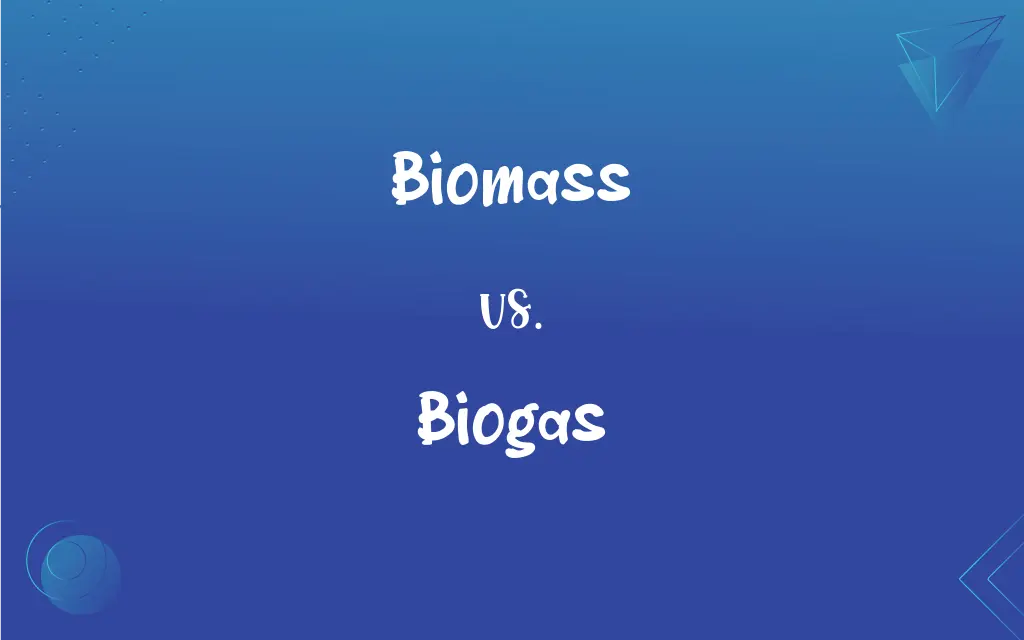Biomass vs. Biogas: What's the Difference?
Edited by Janet White || By Harlon Moss || Updated on November 17, 2023
Biomass is organic material used for energy; biogas is a gas produced by decomposing biomass.

Key Differences
Biomass encompasses a variety of organic materials, including wood, crop residues, and animal waste, utilized as an energy source. In contrast, biogas emerges from the anaerobic decomposition of biomass, offering a flammable gas mixture.
Biomass acts as a renewable energy resource, commonly used in direct combustion for heat or electricity. Biogas, on the other hand, captures the energy potential of biomass in gas form, suitable for heating, electricity, or as a vehicle fuel.
The utilization of biomass is diverse, ranging from simple wood burning in stoves to more complex biofuel production. Biogas presents a specific subset of this utilization, as it results from the bacterial breakdown of biomass in an oxygen-free environment.
Sustainability is a notable advantage of biomass, as it’s sourced from continually replenished organic matter. Biogas, in its turn, aids in reducing greenhouse gas emissions by capturing methane that would otherwise escape into the atmosphere.
Harvesting biomass generally involves farming, forestry, or waste collection. To produce biogas, specific processes like anaerobic digestion or fermentation are essential, transforming biomass into a usable gas.
ADVERTISEMENT
Comparison Chart
Definition
Organic material used for energy
Gas resulting from biomass decomposition
Source
Wood, crops, animal waste
Anaerobic digestion of biomass
Usage
Direct combustion, biofuel production
Heating, electricity, vehicle fuel
Environmental Impact
Renewable, reduces dependency on fossil fuels
Captures methane, reduces greenhouse gas emissions
Process
Harvesting, farming, collection
Anaerobic digestion, fermentation
ADVERTISEMENT
Biomass and Biogas Definitions
Biomass
Biological material derived from living or recently living organisms.
The forest provides ample biomass for the local community.
Biogas
Mixture of methane and carbon dioxide resulting from fermentation.
Capturing biogas during fermentation prevents methane release.
Biomass
Plants or animal matter utilized for fuel or energy production.
Corn is a type of biomass that can be converted into ethanol.
Biogas
Gas produced by the anaerobic decomposition of organic matter.
The farm generates biogas from cow manure.
Biomass
Organic materials used as a renewable energy source.
The factory uses biomass like wood chips for heating.
Biogas
Alternative fuel produced from biomass breakdown.
The facility converts landfill waste into biogas.
Biomass
Agricultural and forestry residues for energy generation.
The sawmill sells its wood waste as biomass.
Biogas
Renewable energy source derived from biological waste.
They've set up a biogas plant in the village.
Biomass
Feedstock for producing biofuels.
Algae is a promising biomass for biodiesel production.
Biogas
Flammable gas obtained from anaerobic digestion.
With a biogas setup, households can cook using waste-derived gas.
Biomass
The total mass of living matter within a given unit of environmental area.
Biogas
A mixture of methane and carbon dioxide produced by bacterial degradation of organic matter and used as a fuel.
Biomass
Plant or animal material, such as forestry byproducts or agricultural waste, that is used as a fuel or energy source.
Biogas
A mixture of methane and carbon dioxide, produced by anaerobic digestion of organic waste matter, used as a fuel
FAQs
How is biogas generated?
Biogas is produced through the anaerobic decomposition of biomass.
Can biomass be used for transportation fuels?
Yes, biomass can be converted into biofuels like ethanol or biodiesel.
What is biomass primarily made of?
Biomass is made of organic materials like wood, crops, and animal waste.
Is biogas a clean energy source?
Yes, biogas is considered clean, especially as it captures methane, a potent greenhouse gas.
How is biomass harvested?
Biomass is obtained through farming, forestry, or waste collection.
Is biomass renewable?
Yes, biomass is a renewable energy resource sourced from continually replenished organic matter.
Can biomass replace coal in power plants?
Some power plants co-fire or replace coal with biomass, but modifications might be required.
Are there environmental concerns with biomass?
While biomass is renewable, unsustainable harvesting or land use changes can pose concerns.
Can all plants be considered biomass?
Technically, yes. However, some plants are more energy-efficient as biomass than others.
What's the difference between biogas and natural gas?
Biogas is produced from organic matter, while natural gas is a fossil fuel, primarily methane, from underground deposits.
Can biogas be used for cooking?
Yes, many households use biogas as a cooking fuel.
Are there technologies to convert biomass into electricity?
Absolutely, biomass can be directly combusted or gasified to produce electricity.
Is biogas production limited to specific regions?
While any region with organic waste can produce biogas, efficiency might vary based on temperature and feedstock availability.
Does biomass have a carbon footprint?
Biomass does release carbon when burned, but it’s carbon-neutral since the carbon was recently absorbed from the atmosphere by the plants.
What safety precautions are needed for biogas?
Proper storage, handling, and venting are crucial as biogas is flammable and contains methane.
Does biogas production have a smell?
Biogas production can have an odor, primarily due to the organic decomposition process.
Can biogas power vehicles?
Absolutely, biogas can be refined and used as a vehicle fuel.
Can biogas be stored for later use?
Yes, biogas can be stored and utilized on-demand.
Is wood the primary source of biomass?
Wood is a major source, but biomass also includes crops, residues, and animal waste.
What's the primary component of biogas?
The main component of biogas is methane.
About Author
Written by
Harlon MossHarlon is a seasoned quality moderator and accomplished content writer for Difference Wiki. An alumnus of the prestigious University of California, he earned his degree in Computer Science. Leveraging his academic background, Harlon brings a meticulous and informed perspective to his work, ensuring content accuracy and excellence.
Edited by
Janet WhiteJanet White has been an esteemed writer and blogger for Difference Wiki. Holding a Master's degree in Science and Medical Journalism from the prestigious Boston University, she has consistently demonstrated her expertise and passion for her field. When she's not immersed in her work, Janet relishes her time exercising, delving into a good book, and cherishing moments with friends and family.






































































